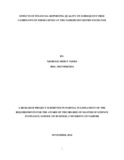| dc.description.abstract | Financial reporting is a formal way, in which a firm represents its activities for information and evaluation of its financial position and performance by its stakeholders, through preparation of the profit and loss acccount, changes in equity statement, balance sheet and the cashflows statement. Upon preparation of these statements, an evaluation is conducted to determine the financial performance of the firm using such measures as Return on Assets (ROA), Return on Investment (ROI), Debt to Equity (D/E) ratio and other liquidity ratios.
The objective of the study was to establish the impact of financial reporting quality on the subsequent cashflows of firms by exploring the effects of relevance, reliability, understandability and comparability as the indictors of financial reporting quality. Further, exploring creative accounting and earnings management which tend to portray the firm’s performance in a positive way in order to attract investors and protect the management from actions of debt holders due to contravening debt covenant conditions.
The research considered financial statements from firms listed at the Nairobi Securities Exchange (NSE) for the period between 2011 and 2015. This involved gathering information on the reporting trends of firms against a content analysis checklist that covered relevance and reliability which are the fundamental characteristics relating to content, and understandability and comparability; the enhancing characteristics relating to presentation as stipulated by International Financial Reporting Standards (IFRS). Descriptive study design was adopted to obtain factual, accurate and systematic data and the Software Package of Social Sciences (SPSS) was used to analyze the data and establish the relation between the variables.
In conclusion, it was established that financial reporting quality affects subsequent cash-flows to a low degree of 23.1% while 76.9% of the influence is caused by other variables. Similarly, it was established that relevance and reliability have a significant relationship with cash-flows while understand ability and comparability were found to be insignificant. | en_US |



